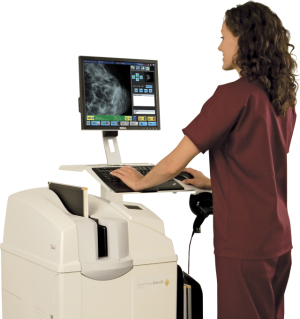by
Brendon Nafziger, DOTmed News Associate Editor | November 04, 2010
Carestream Health said Thursday its mammography feature for computed radiography systems received U.S. Food and Drug Administration approval, making it only the second such system approved by the agency.
The technology lets radiologists convert film-based X-ray systems into digital ones without having to replace the acquisition unit.
"It's a very economical way of going digital," Diana Nole, president of the digital medical solutions business for Carestream, told DOTmed News.



Ad Statistics
Times Displayed: 123176
Times Visited: 7142 MIT labs, experts in Multi-Vendor component level repair of: MRI Coils, RF amplifiers, Gradient Amplifiers Contrast Media Injectors. System repairs, sub-assembly repairs, component level repairs, refurbish/calibrate. info@mitlabsusa.com/+1 (305) 470-8013
Compared to film-based units, digital ones can streamline workflows by letting practitioners see images while the patient is still present, Nole said. It also eliminates the need for chemicals for film processing, added Dina Vazzana, general manager of mammography solutions for the company.
The Rochester, N.Y.-based company said the Carestream Directview CR Mammography Feature will now be available when buying all Directview Elite, Classic or CR 975 systems. It can also be installed in current Elite, Classic or CR 850, 950 and 975 systems by purchasing a software upgrade with specialized screens and new cassettes.
The list price for upgrades starts at $32,000, and for new units at $66,000, the company said.
The feature has been available in Europe, Japan, Latin America and Asia since 2005, and Canada since 2007. Several thousand systems are installed worldwide, the company said.
Four years ago, Fujifilm Medical Systems was the first company to get FDA approval for a CR-based digital mammography system. Agfa also has a CR mammography system available in Canada.
But Carestream's may be the last to, technically, get FDA approval: the FDA said Thursday it was
reclassifying digital mammography systems from its high-risk Class III category to its medium-risk Class II category, meaning in the future systems would likely only need to go through a 510(k) clearance process. They would thus be "cleared," in FDA's language, not "approved."
Carestream said it hopes to have the product ready for sale, once some final product labeling is taken care of, before the Radiological Society of North America's annual meeting arrives at the end of this month.
The company said it's aiming to sell some hundreds of units in the United States and other markets over the next 12 months. The company also hopes FDA approval excites the interest of buyers in other countries.
"Having FDA approval is an influencer for buying decisions outside the U.S. for markets that look at that approval before they decide on purchasing a CR unit, like Puerto Rico, New Zealand and Australia," Nole said. "They're looking for economical solutions that are digitally savvy."

